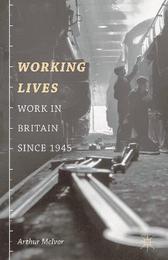
|
Working Lives: Work in Britain Since 1945
Paperback / softback
Main Details
| Title |
Working Lives: Work in Britain Since 1945
|
| Authors and Contributors |
By (author) Arthur McIvor
|
| Physical Properties |
| Format:Paperback / softback | | Pages:360 | | Dimensions(mm): Height 235,Width 155 |
|
| Category/Genre | British and Irish History |
|---|
| ISBN/Barcode |
9781403987679
|
| Classifications | Dewey:941.085 |
|---|
| Audience | | Tertiary Education (US: College) | |
|---|
|
Publishing Details |
| Publisher |
Bloomsbury Publishing PLC
|
| Imprint |
Red Globe Press
|
| Publication Date |
12 July 2013 |
| Publication Country |
United Kingdom
|
Description
A balanced and richly informed survey that investigates how, why and to what degree working lives have been transformed over the last 60 years. McIvor covers themes such as gender, race, class, disability and health in his exploration of how the meaning of employment has been signified by the workers themselves.
Author Biography
Arthur McIvor is Professor of Social History and Director of the Scottish Oral History Centre at the University of Strathclyde, Scotland. He is the author of A History of Work in Britain, 1880-1950 and co-author of Miners' Lung: A History of Dust Disease in British Coal Mining.
Reviews"McIvor offers a broad perspective of the effects of the changes in the British economy on the daily lives of working people since WWII. Exhbiting an exemplary grasp of the secondary literature, McIvor delves deeply into the meaning of work and its associated values and ideals; its differential experience among men, women, immigrant groups, and the disabled; the effects of work on both the body and the mind; and, finally, the experience of unemployment and retirement." - Choice "This book will be a valuable addition for students and scholars of twentieth-century working lives and will undoubtedly be cited as a key text. It is a sensitive, balanced and richly informed survey." - Sheila Blackburn, University of Liverpool, UK "A comprehensive, thoroughly researched text, that makes excellent use of oral history transcripts." - Alan Booth, University of Exeter, UK
|